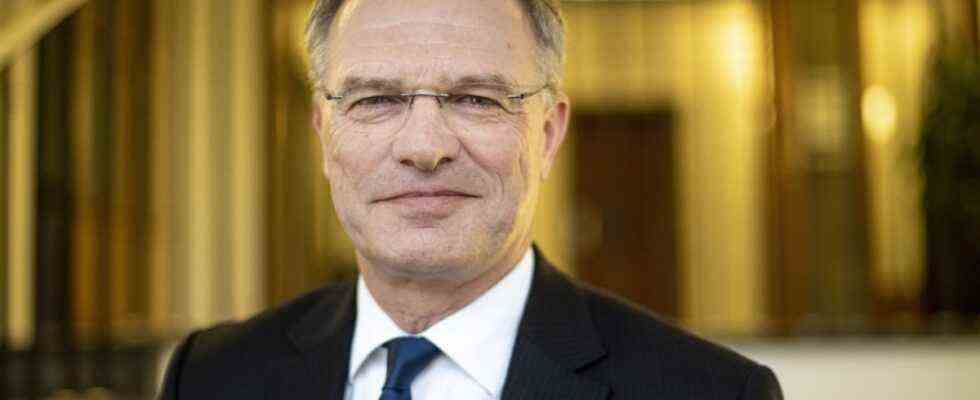It should finally work on the third attempt: on Thursday the radio council of Deutschlandradio will meet in Berlin, and the election of the director is on the agenda. This has already had to be postponed twice. Last September, the rail strike prevented the Radio Council from being able to meet in person, in December it was the restrictions due to the corona pandemic. However, since the statutes stipulate that the supervisory body of the public broadcaster with the three national programs Deutschlandfunk, Deutschlandfunk Kultur and Deutschlandfunk Nova may not hold elections online, the choice of director had to be removed from the agenda.
They are under time pressure 45 members of the Radio Council not because of these shifts. Stefan Raue’s contract runs until the end of August, and above all: the 63-year-old will almost certainly remain in office. Raue, director of Deutschlandradio since 2017, is the only candidate in this election, which is therefore only a formality – a second five-year term for Raue is considered agreed.
His success speaks for him: Never before have so many people heard the programs of Deutschlandradio as during the last survey of listener numbers in the summer of last year (new figures will be available at the end of March): According to the Media Analysis working group, which monitors radio use among the Asked by listeners, 2.23 million people tune in to Deutschlandfunk every day. This makes it the only information radio among the ten most popular programs in Germany. Deutschlandfunk Kultur has 570,000 listeners every day, the young service Deutschlandfunk Nova, which only has DAB and no FM frequencies, reaches more than 140,000 listeners every day – that too is more than ever before in the history of the radio station. At the same time, the number of retrievals in the DLF audio library skyrocketed, most recently by more than 40 percent within a year. However, the broadcaster does not name specific user data.
Deutschlandradio worked with the University of Cologne in a multi-year research project to further develop radio into a customizable medium. The results were presented in February. Above all, it’s about algorithms that don’t work according to a commercial logic, according to which you get recommended more and more of what you’re already interested in.
Deutschlandradio receives 54 cents of the EUR 18.36 broadcast fee
From Stefan Raue’s point of view, advertising for the acceptance of public broadcasters is just as urgent as further digital development – in politics and in society. Last year, the increase in the license fee had to be appealed to the Federal Constitutional Court after the state parliament of Saxony-Anhalt had previously refused its consent.
Deutschlandradio is not at the center of the dispute over the financial endowment of the public broadcasters and their mandate. It’s more like he’s suffering collateral damage. The broadcaster, based in Cologne and Berlin, is not fundamentally criticized, unlike ARD and ZDF. Because he neither competes with private radio stations with a fee-financed offer, nor does he spend money on expensive sports rights or entertainment shows due to the lack of TV channels. Its administration is lean and the overall level of its programs is unchallenged. Nevertheless, Deutschlandradio is proportionately affected by the savings to the same extent as ARD and ZDF, which are the main targets of the public criticism of excessive spending and inadequate offerings. Deutschlandradio currently receives 54 cents of the EUR 18.36 monthly broadcasting fee.
According to Raue, addressing the listeners as equals instead of from the pulpit contributes to acceptance in society. There was a culture change in the house. Representation and participation are also key. That’s why Raue introduced the think tank, among other things. It enables the public to define a main theme for each year, which the editors then deal with more intensively over a period of twelve months. The current topic is: Work in Germany. Last year it was the “search for the we”. Raue also specifically promotes the diversification of the workforce. An expression of this is the broadcast series Voice Versain which different podcasts are brought together, all of which are the responsibility of people with a migration background and bring different cultures and milieus into contact with each other in two languages.
A year ago, Stefan Raue parted ways with program director Andreas-Peter Weber and took Jona Teichmann from WDR as his successor. His reasoning: It is advisable to fill management positions at least every ten years in order to set new dynamics in motion. Weber was not undisputed internally. A number of employees, especially in the cultural program, were bothered by his communication style and accused him of the fact that the austerity measures were opaque. In 2018, the mood hit rock bottom. That was a year after Raue took over as director. Today it seems that he has managed to pacify the house after this difficult start.

